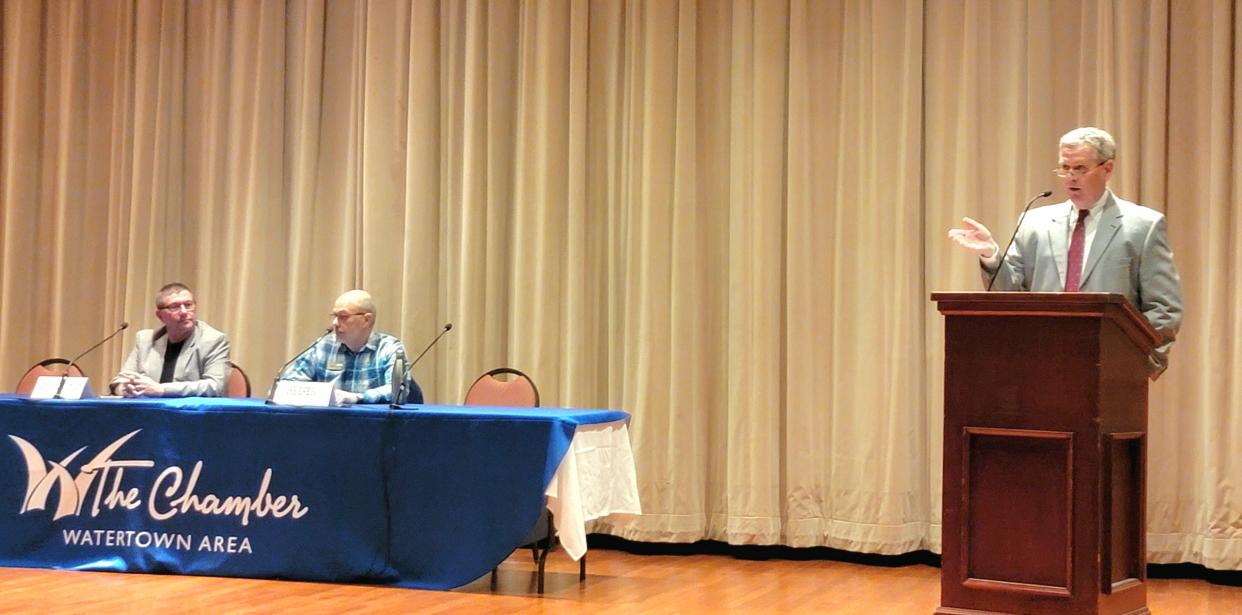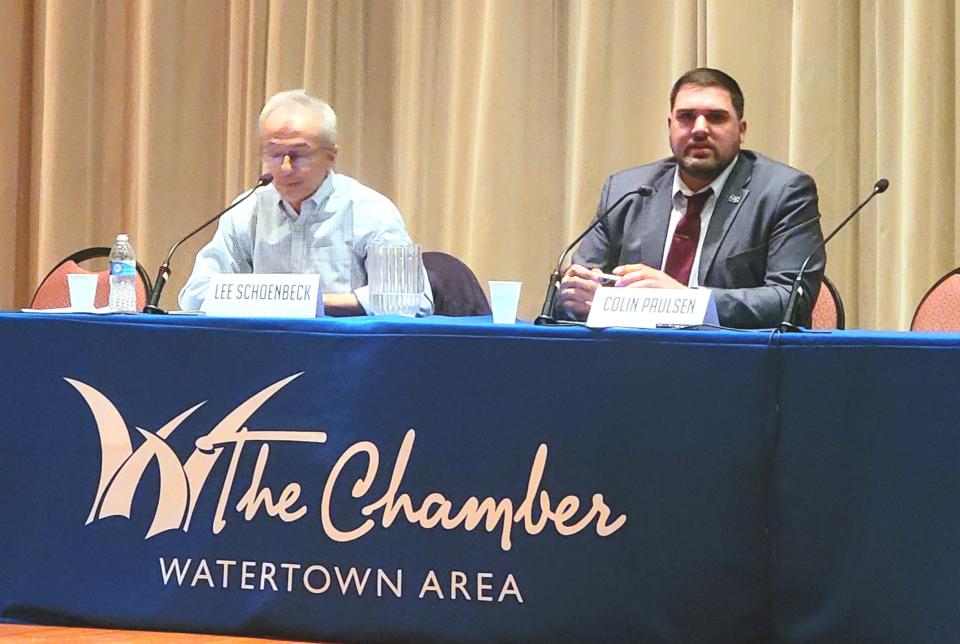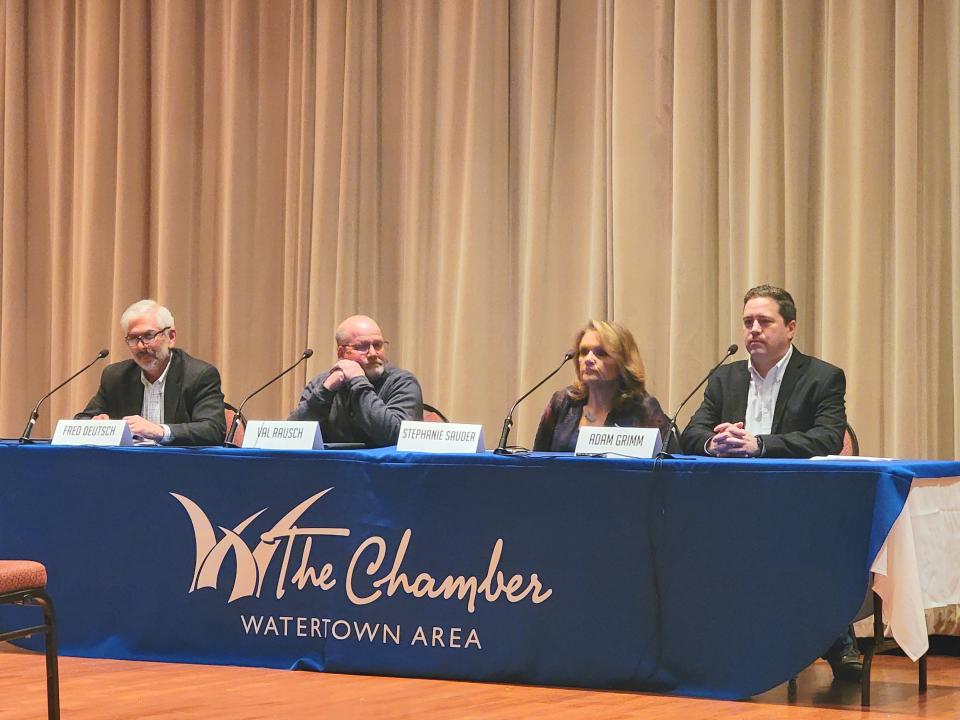From detention center to pipelines, Republican candidates share views at forum

Republicans have plenty to contemplate after this week's candidate forum at the Watertown Event Center.
Primary election candidates for Codington County Commission and legislative Districts 4 and 5 discussed issues ranging from the detention center in Watertown to a carbon dioxide pipeline planned to cross eastern South Dakota.
All of the candidates at forum were Republicans as those are the races local voters will decide in the June 7 primary.
Here are some takeaways from Tuesday's event.
The candidates
Codington County Commission
Codington County Commission District 1 Republicans Lee Gabel and Kerry Jorgenson, both of Watertown, meet in the primary. The winner will advance to the Nov. 8 general election and face Raymond Johnson, D-Watertown, to represent the district for four years.
District 4 House
Republican candidates on the primary ballot include incumbent Fred Deutsch of Florence, Adam Grimm of Wallace, Stephanie Sauder of Bryant and Val Rausch of Big Stone City. The top two vote getters in June will be on the November ballot with Travis D. Paulson, D-Wallace. Each legislative district has two House members.
District 4 includes the southeast corner of Roberts County, along with most of Clark County and all of Grant, Deuel, rural Codington and Hamlin counties.
District 5 Senate
Republican voters will pick between Lee Schoenbeck and Colin A. Paulsen, both of Watertown, on June 7. The winner will be unopposed in November. Each legislative district has one senator.
District 5 includes most of Watertown.
Codington County Detention Center
Asked what the biggest issue facing Codington County is, Gabel and Jorgenson agreed that obtaining the money necessary to construct a new detention center is a considerable challenge.
"I feel (the cost) shouldn't be all laid onto the county. We shouldn't be liable for everything," said Jorgenson.
When it comes to the jail issue, Gabel thinks a solution is keeping people out of the justice system.

"By making sure the community works together to help people," he said. "For the community to have assets like faith-based organizations or programs like those through (the Human Services Agency), that can help folks and help prevent them from getting involved in the justice system."
District 4 candidates were asked if they would support a half-cent sales tax increase to help cover the expense of building a new regional jail.
Legislation has been proposed to address this issue for Codington County and other counties that do not have a jail at all, Deutsch said. He said would not support a tax increase, but is vested in finding a solution.
"This summer, there will be a study on how to solve this," Deutsch said, referring to a legislative summer study.
Rausch and Grimm both expressed concern over temporarily raising taxes because the increases often become permanent.
"You agree to a little tax raise here and there. Then, that tax remains after the sunset clause," Grimm said.
Gathering knowledge from people in the justice system would help Sauder determine the community's needs regarding the jail, she said.
"I would like to get their views before making a definite decision," Sauder said.
More: June 7 primary ballot loaded with races for Watertown area voters
When the question was asked to the candidates of District 5, Schoenbeck said that he voted against the half-cent sales tax for counties and that he continues to believe raising taxes for regional jails is not the best option.
"That's a bad idea if you want a regional jail," said Schoenbeck. "The first thing that will happen if Codington County enacts a half-cent sales tax is all the counties around the area that will use the jail will say that they don't need to help" fund it.
Schoenbeck confirmed Deutsch's earlier statement that the state is looking for ways to help regional jail efforts involving multiple counties, including how to pay for them.
Paulsen said he would also oppose a half-cent sales tax increase.
"I have been very vocal about keeping sales taxes as low as possible and possibly even lowering taxes," he said.
Eminent domain, pipelines, wind turbines
Landowners throughout the region are concerned about a proposed carbon dioxide pipeline in eastern South Dakota and wind farms. Candidates were asked their thoughts on private industry and its use of eminent domain.
Summit Carbon Solutions has proposed a 2,000-mile pipeline that would pump liquefied carbon dioxide from 31 ethanol plants in South Dakota, North Dakota, Minnesota, Iowa and Nebraska so it could be stored a mile underground in western North Dakota.
The company is seeking the use of eminent domain, with which private land can be taken against a landowner's will, in return for payment, and converted to public use, if there's a public benefit.

To many, there's a difference between the government using eminent domain to, for instance, build a highway or utility and a for-profit company being granted permission to use it.
As people have safety concerns about carbon dioxide pipelines, Gabel said he understands if they are not comfortable with a pipeline crossing their property. But by working with the county zoning officials to help study the issues, he said he can make informed, fair decisions regarding eminent domain.
More: Company hopes to remove carbon dioxide from Glacial Lakes Energy ethanol
"As for the wind turbines, we have improved the ordinance greatly. I would have liked to see more of a setback between dwellings and the turbines, but I believe it's vastly improved from where it was," Gabel said.
Jorgenson expressed support for the CO2 pipeline, but said he does not believe there is a future for wind turbines and that they impose a public safety risk.
"If there was a fire, how do you handle them? No one can answer that, and there have been fires," he said.
Paulsen thinks that landowners should have a greater say over what private companies can do with eminent domain.
"I believe in individual and landowner rights, and it's important to protect those rights. Having the landowners feel confident and comfortable in their position to have the first voice when those companies are coming to them" is important, he said.
Schoenbeck noted on how critical eminent domain is to the quality of life for South Dakotans.
"If you like to flip the light switch and the light comes on, that's because of the eminent domain. The electricity to that switch? That's not magic," he said.
Keeping education local
The candidates were also asked if the role if the local school district is as important today as it used to be.
Removing local government f the decision-making in South Dakota education was opposed by all of the District 4 candidates.
"I would like to see it stay local, and getting bigger government out of education would be a plus," said Grimm. "I think we see the heavy hand of government trying to push agendas and allow all sorts of things to enter the school system that I believe would go against our values for most of South Dakota."
More: Here's how to vote before the June 7 South Dakota primary
Living in a smaller community that has fought to keep its school open, Rausch said he sees the value of a vested interest in local education.
"Local input is best. We want to know who the teachers are. We want to know who the administrators are," he said.
Joint street department facility
County commission candidates were asked if they support the county and Watertown having a joint streets department facility on land the city recently bought.
The city council approved spending $1.2 million to buy about 27 acres along state Highway 20 North for the street department building. Including the land purchase, the new facility is expected to cost about $7.5 million.
More: JLG Architects will design, bid new street department headquarters for $349,400
"Both the city and county are elements of local government, so if you find a way to be cost-effective, you do it," Gable said. "But you do have to be careful with the pots of money. If you have funds that were clearly intended for county use, you want to make sure you spend those dollars legally."
Jorgenson is also in favor of sharing the site and costs with Watertown. However, if the point of co-locating the facility is to save the county and city money, he cautions against overspending on construction.
"We don't need all glitz and glamor of a new building if it does not help our situation," he said.
This article originally appeared on Watertown Public Opinion: Detention center to pipelines, GOP candidates discuss issues at forum

